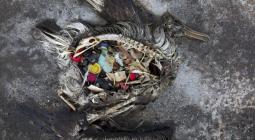South Australia's ban on single-use plastic cutlery and straws hailed as 'historic'

Retailers say they don’t have enough time to adjust to law, which is likely to come into force in early 2021.
South Australia has become the first Australian state to introduce laws banning some single-use plastics including cutlery, straws and stirrers.
Environmental campaigners say the laws, likely to come into force in early 2021, are historic and will help protect wildlife on land and in the oceans.
But the National Retail Association, which represents 28,000 outlets around the country, said retailers in SA had not been given enough time to adjust and the legislation’s definition of “single-use” needed to be clearer.
South Australia’s laws mean that selling, supplying or distributing a “prohibited plastic product” will be illegal.
On the list of banned items are single-use plastic straws, cutlery and drinks stirrers, as well as polystyrene cups, bowls, plates and clamshell containers.
The legislation also lists items that are under consideration to be added to the banned list, including single-use coffee cups and lids and single-use plastic bowls, plates, food containers, balloon sticks, balloon ties, bags and plastic-stemmed cotton buds.
Exemptions have been put in place for people with a disability or a medical need to use the banned items.
The SA environment minister, David Speirs, said no specific date has been set for the laws to come into force, with Covid-19 restrictions still having an impact on society and the hospitality industry.
“This will give businesses time to bounce back and properly prepare before the ban comes into effect in early 2021. This approach strikes an appropriate balance between the public’s desire for change and the needs of businesses.”
SA’s new laws also ban plastics that have additives to make them break apart more quickly into smaller pieces – known as oxo-degradable plastics.
Scientists studying the impacts of plastics on the environment say that as plastics break apart into smaller and smaller pieces, they become available to a wider array of wildlife.
Jeff Angel, director of the Boomerang Alliance, which represents 52 environment and conservation groups on plastics, congratulated the SA government on ground-breaking laws.
He said: “These plastic items are amongst the most littered and represent a major threat to the environment and to wildlife. They all have available and better alternatives.”
Switching to reusable and compostable items was achievable and would cut costs and waste, he said.
Shane Cucow, plastics spokesperson for the Australian Marine ConservationSociety, said: “SA has long been ahead of the curve on plastics. They were the first state or territory to introduce a container deposit scheme way back in 1977 and the first to ban plastic bags in 2009.
“These historic new laws will prevent lethal plastic straws and cutlery from entering South Australia’s waterways and oceans, potentially saving the lives of countless seabirds, dolphins and whales.”
He said some birds feed plastic pieces to chicks, and other animals eat plastics causing life-threatening blockages.
Angel and Cucow said other states and territories needed to follow SA and pass their own laws.
Queensland and the ACT already have legislation before their parliaments. Western Australia and New South Wales have held public consultations on similar laws, and Angel hoped legislation would follow in those states later this year.
The Australian Packaging Covenant Organisation – a collaboration between federal and state governments and industry – has a national target to phase out of “problematic and unnecessary single-use plastics packaging” by 2025.
Ebony Johnson, a policy manager working on plastics at the National Retail Association, told Guardian Australia any new laws needed to be nationally consistent.
The association was part of the SA taskforce to develop the laws, but Johnson said a timeline of “early 2021” did not give retailers enough time to find alternative products or develop new approaches.
“Early 2021 is unrealistic for most retailers,” Johnson told Guardian Australia. “This can be very complex for small businesses.”
The association said in a statement it congratulated the government on the new laws and said its members were “eager to comply”.
The SA legislation defines single-use as “a product designed or intended to be used once or for a limited number of times before being disposed of” – a definition the association said was ambiguous.
Johnson said the phrase “a limited number of times” was open to interpretation. “What about a plastic baby spoon or a picnic set?” she said. “We need clarity to obey a law.”
10 September 2020
The Guardian






